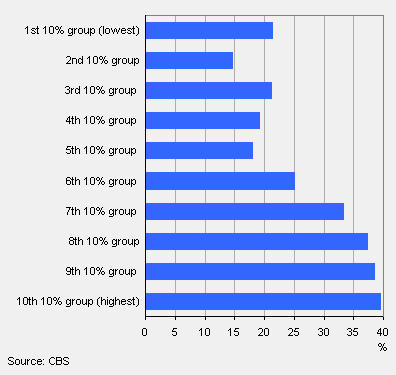Wealthy baby boomers

Post-war baby boomers are relatively wealthy. Households, in which the main breadwinner is aged between 50 and 65, are relatively often found in the highest income brackets and more often than people in other income groups, they have accumulated a large personal fortune. Their spending patterns also tend to be more lavish.
Overrepresented in highest income brackets
Although only 27 percent of Dutch households had a main breadwinner in the 50–65 age category in 2008, this category constituted 43 percent of the 10 percent highest incomes. The average disposable income of these households was 88 thousand euro. With 37 percent, baby boomers were also well represented in the second highest income bracket.
Proportion of households with main breadwinner in 50–65 age group, by income category, 2008

Household capital also often high
Save high incomes, baby boomers also often have accumulated a considerable wealth. Last year, for example, nearly 40 percent of households in the three highest income brackets included a main breadwinner aged between 50 and 65. In the remaining seven income groups, baby boomers were underrepresented.
With 65 percent, the proportion of baby-boom households who own the house they live in is the highest of all households. Nearly three in ten baby-boom households possessed debentures and/or shares.
Life stage and generation
The relatively high level of prosperity of the baby-boom generation is partly due to the stage of life they are in. People aged between 50 and 65 are at the top of their career, their children have (almost) left the house and their mortgage is largely paid off. Another significant factor is that the majority of baby boomers entered the labour market in the 1960s and 70s, when the economy was booming and they also benefitted from the fact that prices for residential property were soaring.
Proportion of households with a main breadwinner aged between 50 and 65 by prosperity level, 1 January 2009

Higher household spending
The average household with a main breadwinner aged between 50 and 65 spent more than 34 thousand euro in 2008, i.e. 9 percent more than the average Dutch household. Baby boomers tend to spend considerably more money on their homes and on traffic and transport and food.
Average household spending, 2008

Linda Moonen and Peter van Teeffelen